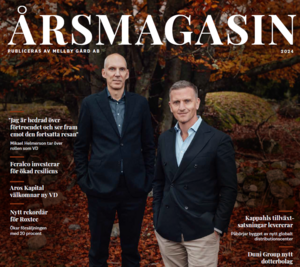
FMG Circular Invest
FMG Circular Invest is a joint investment initiative between Mellby Gård and its subsidiary Feralco AB. The aim of the initiative is to invest in innovative companies that solve problems related to drinking water supply and wastewater management. By combining Feralco’s expertise and network in the water sector with Mellby Gård’s long-term active ownership strategy, FMG Circular Invest is the perfect partner for innovative companies in water technology.
The challenges of drinking water and wastewater are continuously increasing alongside population growth, urbanization and a growing awareness of the impact of water management on climate and the environment that is resulting in stricter regulatory requirements. Water is also a rapidly growing area for innovation in technological solutions promoting management, preparedness, purification, monitoring and accessibility. Through targeted investments, these innovations can be evolved further and help address current and future water challenges. FMG Circular Invest focuses on four investment areas: phosphorus or nitrogen removal, circularity in water treatment, micro-pollutant separation, and water monitoring and measurement. The company also sees potential for investments in other adjacent areas linked to water.
At the helm of FMG Circular Invest are Mellby Gård’s Mikael Helmerson and Filip Schager, together with Feralco’s two CEOs Ludovic Huitorel and Stephen Childs.
Focus areas for investment
-
Phosphorus or nitrogen removal
Innovations to remove phosphorus or nitrogen from wastewater – for lower eutrophication.
-
Circularity in water treatment
Solutions for better reuse of nutrients and energy in residues from water treatment processes.
-
Separation of micropollutants
Micropollutant separation solutions – reducing the spread of microplastics and micropollutants such as PFAS.
-
Water monitoring and measurement
Solutions that improve the measurement and monitoring of processes for water distribution and water treatment.
The portfolio
The British company I-Phyc was FMG Circular Invest’s first investment. The company is part of the phosphorus removal focal area, as they have devised a solution for removing phosphorus and ammonia from wastewater. I-Phyc uses LED lighting to allow microalgae naturally occurring in watercourses to thrive and consume contaminants in wastewater. Find out more here.
Spec-Imaging has developed a new type of spectrophotometer, a technology for liquid analysis. Unlike more conventional methods in which the concentration of a specific substance in a turbid liquid sample can only be analyzed after dilution, the company’s technology is able to analyze the concentration of a specific substance even in turbid liquids. Find out more here.
....................................................
Acwa has developed a robot that is used in the water supply networks that provide communities with drinking water. Depending on the geography, 20–40 percent of the water produced is currently lost due to pipe leakage. Using sensors and cameras, Acwa’s robot can check the quality of the pipes and detect damaged and weakened sections. In this way, pipes can be repaired where needed instead of replacing entire water supply systems. This saves time, money – and ultimately water. Find out more here.
During the water treatment process, sludge is formed as water treatment chemicals bind to dirt and contaminants from the contaminated water. In countries that have regulations governing the management of PFAS-contaminated sludge, it is costly for wastewater treatment plants to dispose of the sludge. Aqua Green has developed a patented pyrolysis technology that breaks down PFAS while allowing the organic material in the sludge to be used to generate energy and/or as biochar. Find out more here.
....................................................
The Australian company Bygen's has developed a patented process for producing activated carbon from agricultural waste. Activated carbon is used for multiple industrial applications including cleaning contaminated soil, water and air. Bygen’s technology operates at significantly lower temperatures than conventional production alternatives, reducing energy use in the production and thus limiting the carbon footprint. Find out more here.




